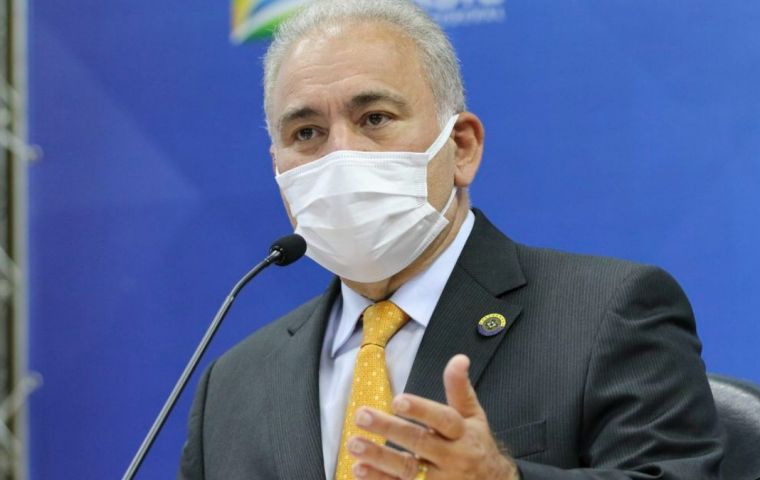MercoPress. South Atlantic News Agency
Cases of Deltacron confirmed in Brazil
 Measures depend on each local scenario, Queiroga pointed out
Measures depend on each local scenario, Queiroga pointed out Brazil's Health Minister Marcelo Queiroga Tuesday confirmed two cases of the Deltacron variant of COVID-19 had been detected in the country.
Deltacron is a portmanteau word for Delta plus Omicron, which combines genetic characteristics of both strains, somnething the World Health Organization (WHO) has been monitoring since the beginning of the month, when the first cases were identified in France, it was reported.
“Our genomic surveillance service has already identified two cases in Brazil. One in Amapá, the other in Pará,” Queiroga told reporters in Brasilia. The minister also pointed out that, in a pandemic context, viruses spreads more easily among the population, and replicate faster. Hence, the chances of it mutating increase. This fact underlines the importance of people getting vaccinated, according to Queiroga.
“This variant [the Deltacron] is considered of importance and requires monitoring,” the minister also explained. He also warned that even amid the current slowdown in COVID-19 cases, health authorities must remain vigilant.
“Everything that happens in other countries, we observe. We monitor all cases, and this is the fruit of the strengthening of the genomic surveillance capacity in Brazil,” he added.
The minister also highlighted “the strong investments that the federal government made after the pandemic.”
Between Sunday afternoon and Monday afternoon, 11,287 new cases of COVID-19 were confirmed nationwide, including 171 deaths.
Saturdays, Sundays, and Mondays, the figures tend to be lower than during other days because of to the difficulties passing on the information during weekends. Nevertheless, the overall results indicate an improvement in the situation.
With this scenario, several states and municipalities have already relaxed sanitary control measures, such as the mandatory use of protective masks.
“The STF [Federal Supreme Court] has delegated to states and municipalities the prerogative, in a complementary way to the Union, to rule about the use of masks. It is not about forcing people not to wear masks, but to dispense with the use of masks. And this depends on the [local] epidemiological scenario. You have to do this in an intelligent way. For example, even though the number of cases is slowing down, it is recommended that we continue to wear masks at hospitals,” Queiroga explained.




Top Comments
Disclaimer & comment rulesCommenting for this story is now closed.
If you have a Facebook account, become a fan and comment on our Facebook Page!